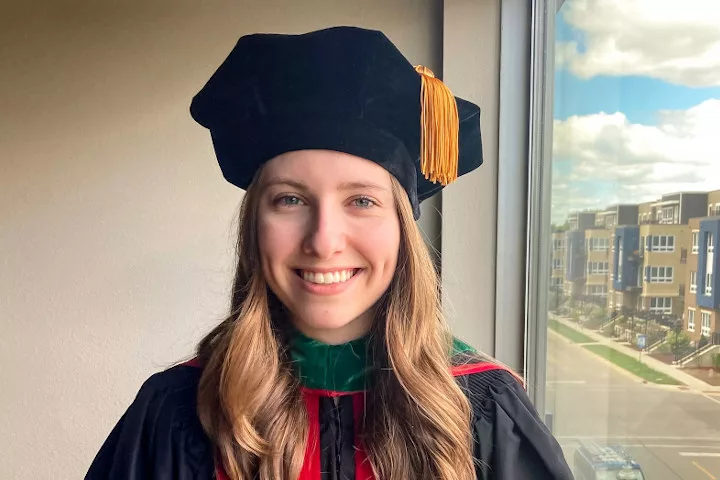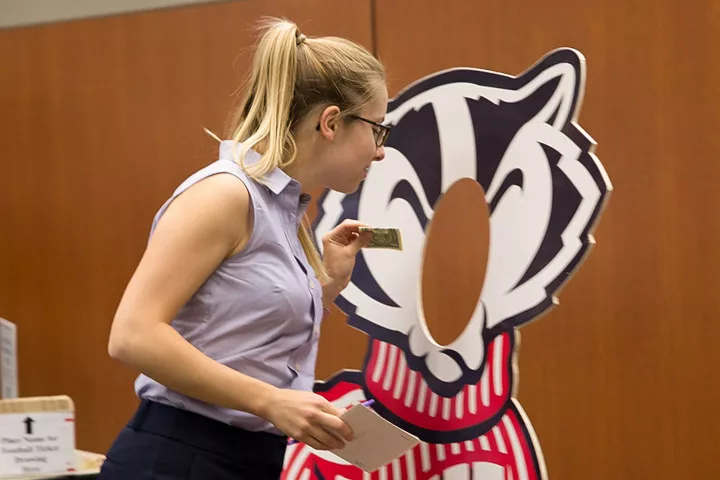Elaine Alarid Nurtures the Next Generation of Mentors
From her earliest days as a budding scientist, Alarid says she’s always had someone in her corner, which has made all the difference.
For Vivian Gama, MD ’21, earning her medical degree from the University of Wisconsin School of Medicine and Public Health (SMPH) was something she did not see coming.
Born in São Paulo, Brazil, Gama moved at age 5 with her family when they immigrated to the United States in 2000 for her father’s job. They first lived in Ohio, where she had to integrate into kindergarten just two months before the end of the school year. The teacher helped Gama — who spoke only Portuguese — start learning to write English by copying the work of a boy sitting next to her in class.
Within four months, Gama was fluent in English.

While medicine was not on her mind then, looking back she says this formative period helped her gain skills that will serve her well in her career as a physician.
“Part of coming to the United States and not knowing the language was about reading body language, and understanding and reading a room,” Gama explains. “Being able to interpret those cues is key to being a good physician. This is especially true when working with people who don’t speak English because they may say they understand something, but their non-verbal cues are telling a different story.”
Her father’s career also took the family of five to Florida, where Gama picked up the Spanish language. Ultimately, in 2008, they settled in Cedarburg, Wisconsin, just before Gama and her twin sister started high school.
It wasn’t until Gama attended UW–Madison for her undergraduate degree that becoming a physician entered her mind. She started with an engineering major but gravitated toward biology courses, eventually graduating with a degree in microbiology and a certificate in global health. She describes her trajectory as a natural evolution to medicine.
“When I look back, in the culture I grew up in, there are a lot of close relationships and personal ties,” she explains. “The physician-patient relationship is embedded in that. I found that appealing, and forming these relationships comes naturally for me. It’s been a great strength.”
Gama’s experience as an immigrant is mixed but overall positive, she says. Even after being in the United States for several years, people still made comments about her family’s immigration status, and she felt defined by being Brazilian. However, after spending more time in the community, it began to feel more accepting and normal. When she and her family members became U.S. citizens while Gama was in high school, the community celebrated.
“There are now times when someone won’t believe my story or wants clarification,” she says. “As a Latina who can often pass as white, I have a certain amount of privilege that I acknowledge and try to harness for the benefit of my patients and others.”
In medical school, Gama served as an ambassador for the Wisconsin Medical Alumni Association and took on roles in student government. Serving as a member of the Medical Student Association, she was a student leader on clinical rotations, worked closely with faculty course directors and provided valuable input based on the student experience. Also, because Gama wanted to help future students gain insight into the numerous electives available to prepare for residency, she contributed to a guide to help third- and fourth-year students pick electives best suited to their interests.
“I received a lot of support and resources and want to pay that forward and make sure everyone has a great and equitable experience,” she says. “Not having anyone else in my family in the medical field was tough at times, so being able to help others is rewarding.”

With her MD in hand, Gama has moved to Boston for an internal medicine residency at Massachusetts General Hospital. She’s excited that her residency has an educational track because she is interested in medical education and wants to pass along knowledge she gained at the SMPH.
“The fact that we have a school of medicine and public health that has embedded public health issues — such as the social determinants of health — in the curriculum really interested me when deciding on a medical school,” she says. “It adds another dimension of learning and understanding so we can treat patients as a whole. It was something that was very intentional, even from day one.”
Upon her graduation from the SMPH, Gama spoke to the media about her experience of pursuing medical school as an immigrant. WMTV NBC15 ran an interview profiling her story titled “UW–Madison Medical School Graduate Lives Out American Dream.” In the news piece, Gama spoke about her upbringing and her next steps.
“I think I’m more excited than ever to take responsibility for patients now and find a defined role within a team,” she told the news station. “I’m incredibly grateful for it and very humbled by the opportunity; I don’t take it lightly, and I owe everything to my parents for that.”